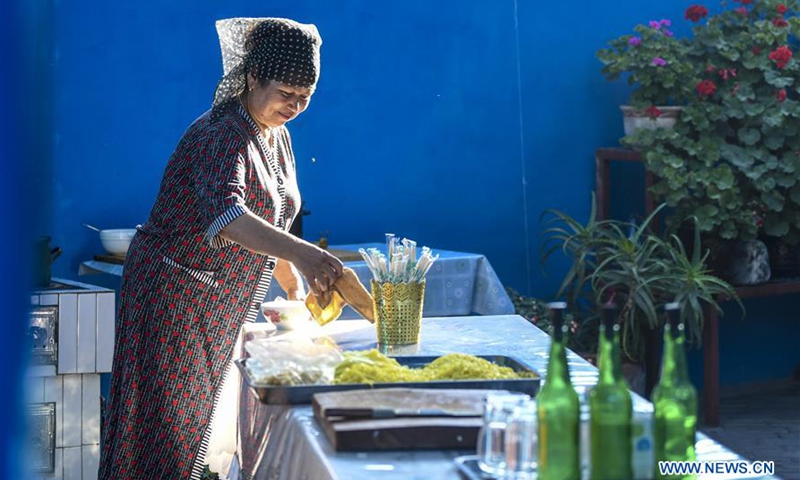Researchers debunk 'birth control' lies of German scholar
Source: Global Times Published: 2020/9/16 22:08:23

A woman prepares snacks for sale at a residential house on Liuxing Street in Yining City, northwest China's Xinjiang Uygur Autonomous Region, July 4, 2020. Photo: Xinhua
"The report is extremely imprecise, fictionalizing the relationship between pictures and texts and maliciously interpreting the cases…" A human rights institute in China refuted German scholar Adrian Zenz's report on so-called birth control in the Xinjiang region. By analyzing Zenz's report, the institute concluded that Zenz's report is based on lax academic research contrary to academic norms and ethics, exposing the political attributes of this report to a certain extent.
On Wednesday, the Human Rights Institute of the Southwest University of Political Science and Law (SWUPS) released a report titled Anatomical Analysis of The Independent Report about the "compulsory sterilization" and "genocide" of Uygurs in Xinjiang by Adrian Zenz.
On June 29, American Jamestown Foundation released the report by German scholar Adrian Zenz, which claimed that Xinjiang is implementing mandatory "genocide" on Uygurs.
However, by conducting thorough research on Zenz's report, the Human Rights Institute of SWUPS found that Zenz adopted a "Hollywood editing technique", fictionalizing the relationship between pictures and articles in the report, and tried to construct an image with some carefully designed language and several selective pictures.
For example, Zenz has repeatedly mentioned the national physical examination in Xinjiang citing Zumrat Dawut, Mihrigul Tursun and Rakhima Senbay, three Uyghur women who claimed they were forcibly sterilized. Zenz goes on to attach a picture showing two Uygur women who had examinations in the hospital.
However, through searching the internet, it was found that the picture came from a popular scientific article from the People's Daily on gynecological examinations.
This popular scientific article clearly indicates that this picture shows that "on November 11th, 2016, several ethnic minority youths from rural areas in Hotan, Xinjiang enjoyed free health examinations for the first time at the 29th Regiment Hospital of the Second Division of Xinjiang Production and Construction Corps."
"Obviously, Adrian Zenz invented the relationship between the pictures and the texts by cutting the photos, and his poor technique and hostile intentions should be rebuffed in academic circles," said the institute's article.
Zenz also attacks Xinjiang's free health checks, saying that it is a means to control the Uygur population.
The development of health services in Xinjiang is an important means to build a "Healthy Xinjiang." Physical examinations help to provide effective intervention measures to solve health problems by obtaining residents' health information and evaluating health risks. Since October 2016, Xinjiang started the first round of its national physical examination project with urban and rural residents of Xinjiang able to enjoy free physical examinations once a year.
By 2019, the national physical examination was fully completed, with a total investment of 5.324 billion yuan in Xinjiang and a total of 70.81 million physical examinations for people from all ethnic groups. The average life expectancy of the whole region increased from less than 30 years before 1949 to 72 years by the end of 2018, an increase of 2.4 times compared with original figures.
Aside from misusing pictures, Zenz also fabricated data sources in his report. In order to achieve the so-called rigor of the independent report, Adrian Zenz listed a large number of relevant data in it. However, it is not difficult to find out through actual verification that the data sources in this report are suspected of being fabricated and taken out of context selectively.
For example, the report pointed out that "In 2018, Kizilsu Prefecture published this blunt statement, explicitly linking the "free birth control surgery" campaign with an intention to move toward mass sterilization of rural populations."
However, through actual verification, it was found that the relevant contents cited in this article came from Article 9 of the "Summary of Poverty Alleviation and Development in the First Half of 2018" issued by Kizilsu Kirgiz Autonomous Prefecture, and have no connection with the relevant situation described in the report.
Adrian Zenz's out-of-context and one-sided connection of a sentence mentioning "mass sterilization" is an extremely irresponsible act of falsifying data sources, which goes against the original intentions and essence of academic research authenticity and reliability, said the SWUPS analysis.
An "independent Report" like Adrian Zenz's is actually a new trend and new tool of international human rights public opinion concerning Xinjiang. It is a means for Western anti-China forces to interfere in China's internal affairs by making false statements in the name of so-called experts.
Posted in: SOCIETY,CHINA FOCUS